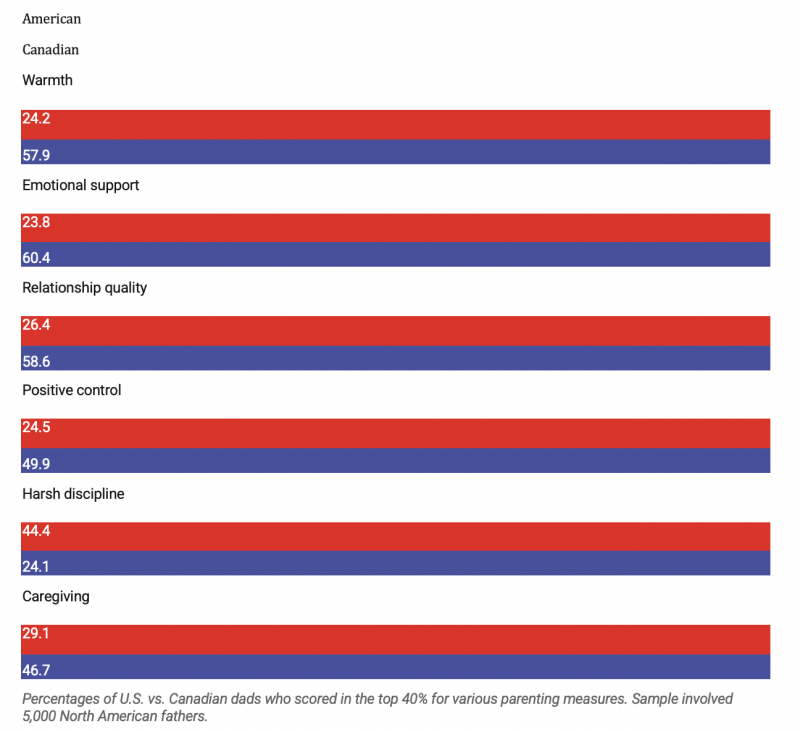Why are Canadian fathers more involved in parenting than American fathers?
October 22, 2021
Author Kevin Shafer – Associate Professor of Sociology and Director of Canadian Studies, Brigham Young University
Translator: Doan Thi Ngoc – Teacher – Hoa Sen University (HSU)
Thirty-five years ago, Canadian and American fathers did some of the same parenting work as mothers. Surveys from the mid-1980s showed that Canadian men spent 38% of the time and American men spent 35% of the time that women spent on child care.
Today, there are significant gaps in fatherhood between Canadian and American fathers. Canadian fathers spend more time taking care of their children than American fathers. For example, Canadian fathers spend an average of 14 hours, while American fathers spend about 8 hours, on child care each week.
As a sociologist and Canadian research scholar, I am interested in how social policies affect fatherhood in different countries. I collected data on more than 5,000 men in these two countries from 2016 to 2018 for my upcoming book on the similarities and differences between American and Canadian fathers. This data looks at how fathers interact with their children – whether they show warmth and affection towards their children, whether they provide emotional and mental support to their children, and how they discipline their children.
Research data shows that Canadian fathers demonstrate greater emotional warmth when caring for their children, are more emotionally and mentally supportive, are more involved in caregiving, and use more positive discipline. with their children. And American fathers, according to the survey, are better at using spanking and strict discipline with their children.
Why do Canadian fathers outperform American fathers in caring for and showing affection for their children? I believe the answer is partly because Canada has for types of social policies to help them become more connected in their families.
Percent of dads who are highly involved
A survey of over 5,000 North American fathers found that Canadian dads were much more likely to be warm and emotionally supportive, and less likely to use harsh discipline.

Chart: The Conversation/CC-BY-ND Source: Kevin Shafer, Brigham Young University Get the data
1. Family leave policy
There are big differences between the United States and Canada when it comes to family policy.
Canada has a policy that ensures paid family leave. As part of the employment insurance program, Canadian parents are entitled to 35 weeks of benefits and when fathers choose to take five weeks of family leave, they are paid 55% of their regular salary.
Meanwhile, the United States is the only wealthy country in the world that does not guarantee maternity leave and is one of three wealthy countries – along with Oman and the United Arab Emirates – without one. maternity leave options.
Studies from around the world consistently show that men who take paternity leave tend to be more involved in their children’s lives, have better relationships with family members, and help Their partners recover more quickly from giving birth.
2. Policy on social inequality
Falling incomes, high levels of economic inequality, and financial instability have led many American men to work longer hours. In my survey, 1/3 of Americans were asked to work more than 50 hours per week, compared to only 1/10 of Canadian respondents.
Financial worries have greatly affected the parenting of American parents. The rise in intensive parenting methods – that is, parents who try to provide a more nurturing environment for their children with all the difficult extracurricular activities, advanced learning difficulties, and rewards – is the best effort of the student’s middle-income families to keep up with the child-rearing methods of well-off families.
Such parenting models are less common in Canada—a country with more accessible, elite educational institutions, and less income inequality.
Canada Child Benefit helps reduce financial worries for parents. Unlike child taxes in the United States that are paid with a traditional tax return, Canada provides a tax credit in monthly payments to low- and middle-income families when they have a baby. The program has cut child poverty by 40% since it was introduced in 2017. The United States just rolled out a similar temporary program in July 2021.
3. Policy on gender equality _ _ _ _ _
Fathers tend to be more involved in child care in countries with higher levels of gender equality. As women enter the political and economic spheres, fathers provide more physical care for their children, are warmer parents, and more emotionally and mentally supportive, and are less abusive. Use harsher discipline. This may be because expectations are clearer and easier to enforce when parents co-parent their children using an equal partnership mindset.
Canada is a more gender-equal country than the United States. In 2019, the United Nations listed Canada as the 19th most equal country in the world. The United States ranks 46th. Canada surpasses the United States on measures of women’s health, political power, education, and economic empowerment. Reinforcing the expectation that fathers are co-parents, this higher level of gender equality may be an important reason why Canadian fathers do better than their American counterparts.
4. Health care policy
Even policies that seem to have little to do with parenting have a big impact on how fathers interact with their children. This includes a single-payer Canadian universal health care system managed by the province.
For example, analyses in my forthcoming book show that poor physical health reduces parenting efforts less for Canadian fathers than for American fathers. This shows that America’s expensive health care system, combined with its bureaucracy and inefficiency, drains American fathers of their time, energy, and money and makes them more vulnerable. their fatherhood becomes more difficult. This problem is further complicated when children also have health problems.
As society suffers from the COVID-19 pandemic, research data shows that more comprehensive family policies will benefit American fathers, mothers, and children. Doing so can alleviate the particularly difficult burdens mothers face and help remove structural barriers that make it difficult for fathers to participate and engage in parenting. Canada can provide the United States with a useful model of how to implement pro-family policies.
Source: https://gendertalkviet.blogspot.com/2021/10/tai-sao-cac-ong-bo-canada-th…
This article is republished from The Conversation under a Creative Commons license.
The Conversation newspaper and author Kevin Shafer allowed Gendertalkviet to translate into Vietnamese and post the full text. On behalf of the Gender Talk Editorial Board, we would like to send our sincere thanks to the Author and The Conversation Newspaper for allowing us to republish the full text. The contributions of The Conversation Newspaper and the author are very valuable and meaningful.
















